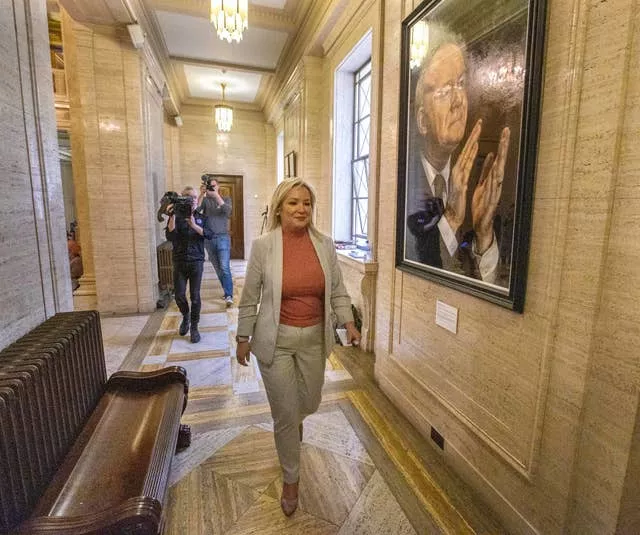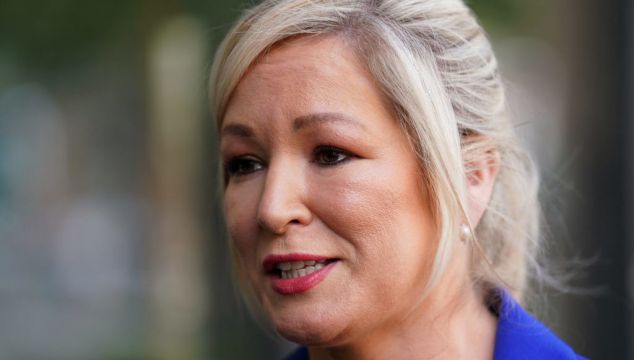Sinn Féin vice president Michelle O’Neill has recalled being “prayed over” at the Catholic grammar school she attended when she became pregnant at 16.
While she paid tribute to her form teacher at the time, she said not everyone at St Patrick’s Girls’ Academy in Dungannon, Co Tyrone had been as supportive.
Ms O’Neill also spoke about having had negative experiences with police growing up as the daughter of an ex-republican prisoner.
The Mid-Ulster representative is currently in line to become Northern Ireland’s first non-unionist First Minister.

It comes after a historic election result in May when Sinn Féin became the largest party at Stormont for the first time.
However, the institutions have been paralysed by the DUP’s refusal to participate until the government in London takes action to address their concerns around the Northern Ireland Protocol.
Ms O’Neill took part in a wide-ranging interview with the BBC in the first of a series of special Red Lines programmes.
Asked about the attitudes she experienced after becoming pregnant as she was preparing to sit her GCSE exams, Ms O’Neill said her form teacher “was absolutely amazing and so, so supportive”.
“I had a form teacher at that time who was absolutely amazing to me and very understanding of that you’re not like every other 16-year-old, you’re doing your GCSEs maybe having been up all night the night before with a child with a sore ear … I’ll always be grateful to her for that,” she said.
“But unfortunately my reality was that not everybody in the school was as supportive, particularly the leadership of the school.

“It was a Catholic grammar. A 16-year-old girl being pregnant was frowned upon and they wouldn’t have been the kindest in terms of their approach to supporting me at that time.”
She said her daughter was born on May 4th, and she sat her first GCSE exam on May 10th, despite having been in intensive care, and having had pre-eclampsia.
“But I remember being very forthright that I had put myself through a lot of pressure that year to keep studying, and I was determined to sit my GCSEs because I wanted to go back to do my A levels,” she said.
Ms O’Neill recalled a “whole fuss” being created when she returned to do A levels, “without asking permission”.
“They created this whole fuss in a school assembly which was quite an embarassing experience … but all these things have helped shape the woman I am today,” she added.
Ms O’Neill said some in the school prayed over her.
“It was actually when I’d just got pregnant. It was nearly like, you know, that I had sinned, and therefore I must be prayed upon which obviously was not the right approach,” she said.
“My parents made that clear also to the school leadership at the time.”
Ms O’Neill referred to herself as “an ordinary person born into extraordinary circumstances”.
She described being born in 1977, “a time when there was a lot of conflict”, “into a society which was actively discriminating against Catholics”.
Ms O’Neill recalled raids by police on her family home, referring to her father Brendan Doris as an ex-prisoner who went on to become a councillor for Sinn Féin.
She described an experience just after getting her driving licence and being stopped by police who she said gave her a fine for not wearing a seatbelt when she had been wearing a seatbelt.
“The words of those officers to me were ‘Well it will be your word against ours, and we know who’s going to come out on top of that’, so that’s the active discrimination that you lived in in society at those times,” she said.
Ms O’Neill said her whole adult life had been about building the peace process.
“I wish the conditions were never here that actually led to conflict. I wish that so many people didn’t have the horrible experience that they’ve had throughout the conflict days,” she said.
“I think the only way that we’re ever going to build a better future is to understand that it’s okay to have a different take on the past.
“My narrative is a very different one to someone who has perhaps lost a loved one at the hands of republicans so I think that we need to be mature enough to say, that’s okay, we’ll have to agree to differ on that one but let’s make sure the conditions never exist again that we find ourselves in that scenario.”







